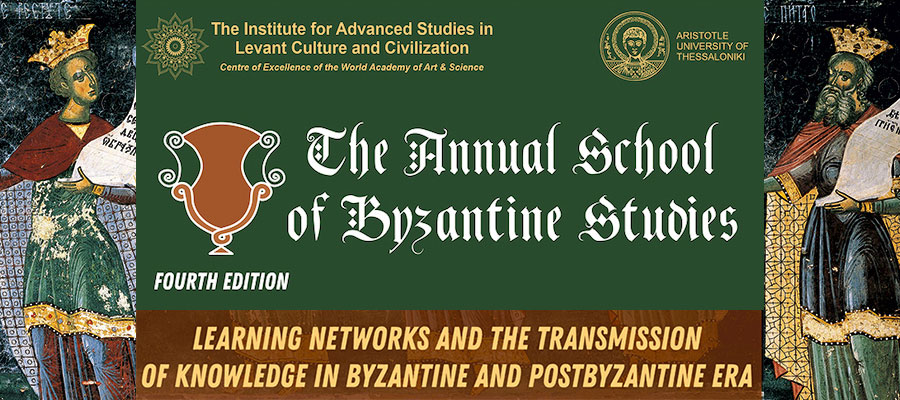Learning Networks and the Transmission of Knowledge in Byzantine and Postbyzantine Era, The Annual School of Byzantine Studies, 4th Edition, Zoom, September 15–21, 2021
The Institute for Advanced Studies in Levant Culture and Civilisation, in partnership with the „Aristotle” University of Thessaloniki, organizes on the 15th-21th of September 2021 the forth online edition of the Annual School of Byzantine Studies, titled Learning Networks and the Transmission of Knowledge in Byzantine and Postbyzantine Era. The scientific director of this event is prof. univ. dr. Athanasios Semoglou („Aristotle” University of Thessaloniki).
The theme of this Edition of the Annual School of Byzantine Studies proposes an interdisciplinary incursion into the Byzantine and post-Byzantine literature, history, palaeography, archaeology, art, through the lens of transmitted knowledge. This ‘transmitted knowledge’ presupposes multiple factors: foremost among them, the texts themselves, which circulated in the form of manuscript copies, secondly, the people: teachers and students, as transmitters and recipients of this knowledge, and also the various scholarly milieux of readers, compilers, copyists who produce, reproduce, and promote new and ancient texts, commissioned by a certain sponsor and intended for a certain audience. They have a practical dimension: they offer to the Byzantine society a practical cultural tool useful for social circumstances in which it is necessary to prove a vast culture, but they are also a didactic tool of transmitting the ancient tradition over the centuries. Cities, in turn, are the ones promoting and connecting this knowledge. Although science was the prerogative of an intellectual, secular, and clerical elite, Byzantine children learned to read and write in primary school, while the future imperial officials followed a higher education. Science was not considered a purely abstract phenomenon but was also subordinated to everyday life. If philosophy, arts and rhetoric were studied at a higher education level, the knowledge of God, the divine wisdom, transmitted through priests, churches and monasteries, the liturgies and the five senses, was also very important and accessible to every Byzantine.
The aim of the Annual School of Byzantine Studies is to aid the development of young researchers – Romanian and foreign alike – by facilitating access to recently uncovered sources and new methodologies in the field. The School offers an unmitigated rapport with some of the great scholars in Byzantine studies of worldwide acclaim, in an attempt to foster a community of young specialists in the field, aiming to revitalize Byzantine Studies in Romania, capitalise upon the Roman-Byzantine cultural heritage found in the Dobruja region and strengthen professional and individual ties between Romanian professors and students on the one hand and foreign specialists on the other through the creation of international partnerships and mobilities.
This year too, due to ongoing health and safety concerns, the School’s activities will move online, to be held via Zoom. The School’s programme features lectures given by invited professors, workshops presenting the newest methodologies and sources available in the field, presentation sessions where PhD candidates and Masters students can showcase their original research, palaeography workshops and virtual tours.
The School’s activities will move online, to be held via Zoom, in English and Romanian, and is addressed to the students, MA and PhD students, and also to other categories of interested persons.
Confirmed invited guests: Prof. Athanassios Semoglou („Aristotle” University of Thessaloniki), Prof. Claudia Rapp (University of Wien, The Austrian Academy of Sciences), Prof. Alexander Alexakis (University of Ioanina), Prof. Stratis Papaioannou (University of Crete), Prof. Emil Dragnev (State University of Moldavia, prof. Ecaterina Lung, lect. Manuela Dobre (University of Bucharest), dr. Anca Dan (CNRS, Paris), dr. Mariana Bodnaruk (Al-Quds Bard College), dr. Andra Jugănaru („Aristotle” University of Thessaloniki).
Registration closes September 13, 2021.
